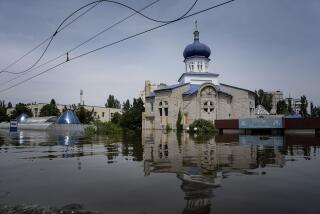Climate linked to conflict in East Africa, study finds
- Share via
A study relating climate to conflict in East African nations finds that increased rainfall dampens conflict while unusually hot periods can cause a flare-up, reinforcing the theory that climate change will cause increased scarcity in the region. The study was published Monday in the Proceedings of the National Academy of Sciences.
Politicians and many scientists have called climate change a security risk, based on the idea that unusual variations in weather are likely to put immense strain on rural societies dependent on farming and livestock for survival. But the results of studies trying to confirm such a hypothesis have been mixed.
The authors of the new study, from the University of Colorado and the National Center for Atmospheric Research, believe that problems with previous studies may have contributed to previous failures to link climate and conflict, including the use of data only at the country level rather than at the regional or local level.
Instead, the researchers used a conflict database called the Armed Conflict Location and Event Dataset, or ACLED, which provides location-specific tracking of individual events across Africa -- from large-scale acts of war to local fights over farmland.
In that dataset, the researchers found two main effects of climate. First, an increase in rain reduced the likelihood of conflict. Second, especially hot temperatures meant about a 30% higher likelihood of a conflict, compared with periods with average temperatures. Interestingly, periods of low precipitation did not affect the likelihood of a conflict.
The authors provide several explanations for the effects. First, an increase in rain often reduces the need for people to live in close proximity around a local water source, thereby diminishing the likelihood of conflicts between groups -- whether over that water or for another reason entirely. Increased rain also leads to bountiful harvests, while increased temperatures lead to livestock deaths and loss of maize crops -- which could lead neighboring groups to loot each other.
Nevertheless, the researchers stressed that the contribution of climate is minor compared with other economic, political and social factors, which also went in to their models and explained conflict far better than changes in precipitation or weather.
Return to the Science Now blog.






